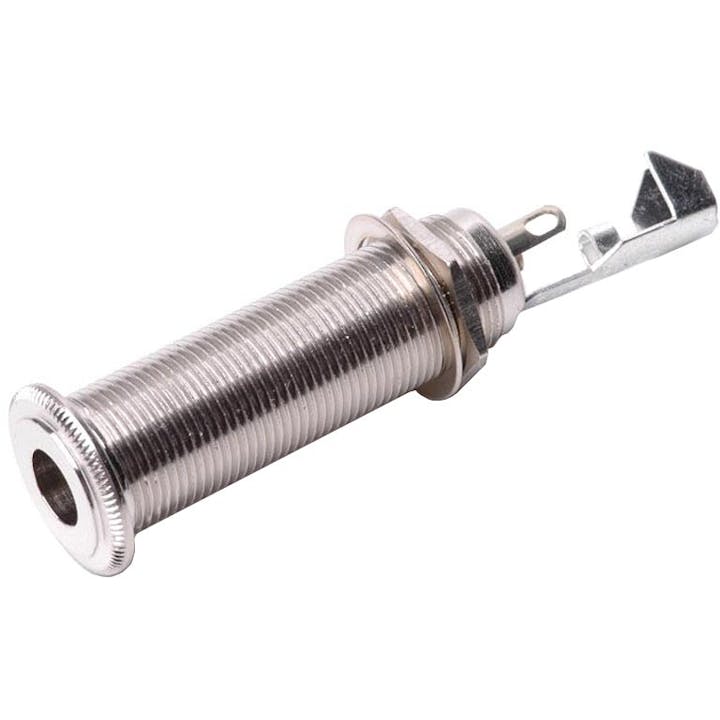Hi,
I would like to install a jack 6.35mm socket for headphone through a thick front plate (8mm). So far the longest 'going-through' that I found is 9mm long (9-10mm diameter), too short to screw it within the front plate. The other option would be to use a xlr-style socket from outside the plate (but around 20mm diameter).
Wondering if someone knows a non-xlr-style socket that could fit?
Thanks
I would like to install a jack 6.35mm socket for headphone through a thick front plate (8mm). So far the longest 'going-through' that I found is 9mm long (9-10mm diameter), too short to screw it within the front plate. The other option would be to use a xlr-style socket from outside the plate (but around 20mm diameter).
Wondering if someone knows a non-xlr-style socket that could fit?
Thanks
Ubergeeknz,
Thanks for your reply.
Thought about something like that, but would likely require something like a straight shank drill (not sure about the name in English, edit: milling cutter). Have only normal drills here. Also, would prefer to 'drill' the back side, not the rear one (edit2: ok, rear and back are the same).
Thanks for your reply.
Thought about something like that, but would likely require something like a straight shank drill (not sure about the name in English, edit: milling cutter). Have only normal drills here. Also, would prefer to 'drill' the back side, not the rear one (edit2: ok, rear and back are the same).
Last edited:
I've used this one successfully in the past.
BKL Electronic Kreimendahl | Klinkeneinbaubuchse 6,3mm Stereo, Einlochmontage, langes Gewinde
Question is... will you find it in your area?
BKL Electronic Kreimendahl | Klinkeneinbaubuchse 6,3mm Stereo, Einlochmontage, langes Gewinde
Question is... will you find it in your area?
There are "looooong" 6.35 mm jacks designed for guitar body mounting, because wood is too fragile to be routed down to 1 or 1.5 mm thick to hold a regular (sheet metal panel) jack or they plain need to reach the internal controls cavity.

search for them at Guitar/Music supply houses, not standard Electonics ones.
This one is from:
Switchcraft Barrel Female Jack Socket for Acoustic Guitars (Stereo) - Andertons Music Co.

search for them at Guitar/Music supply houses, not standard Electonics ones.
This one is from:
Switchcraft Barrel Female Jack Socket for Acoustic Guitars (Stereo) - Andertons Music Co.
Last edited:
Ubergeeknz,
Thanks for your reply.
Thought about something like that, but would likely require something like a straight shank drill (not sure about the name in English, edit: milling cutter). Have only normal drills here. Also, would prefer to 'drill' the back side, not the rear one (edit2: ok, rear and back are the same).
Standard end-mill cutters cannot drill, but ones are available designed to drill, called centre-cut end-mills or slot-drills.
I've used this one successfully in the past.
BKL Electronic Kreimendahl | Klinkeneinbaubuchse 6,3mm Stereo, Einlochmontage, langes Gewinde
Question is... will you find it in your area?
Switchcraft do something very similar so I have ordered one of them as well
152B | Switchcraft 6.35 mm Panel Mount Stereo Jack Jack Socket, 3Pole | RS Components
Alan
End-mills work excellent for counterboring and even drilling, with a few caveats. First, make sure the workpiece is well clamped, and I don't mean with a squeeze clamp. I mean held in a vise that is bolted to the t-slots in a mill or drill press table. If you're using a mill, lock the table. It's also best to hold the end mill in a collet if at all possible.
If it's aluminum, some form of fluid is a necessity to prevent chip welding. This is one of the few things that WD-40 actually works well for. Kerosene, works well too, however the fumes are significantly worse.
Don't even think about trying this with a hand drill.
If it's aluminum, some form of fluid is a necessity to prevent chip welding. This is one of the few things that WD-40 actually works well for. Kerosene, works well too, however the fumes are significantly worse.
Don't even think about trying this with a hand drill.
- Status
- This old topic is closed. If you want to reopen this topic, contact a moderator using the "Report Post" button.
- Home
- Design & Build
- Parts
- Headphone socket for thick front plate?